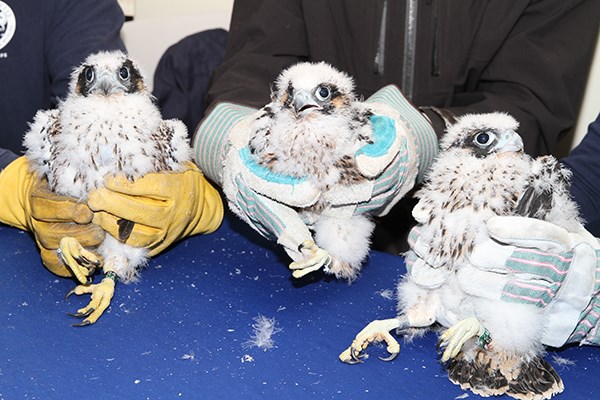Newly Identified Mother Tends to Three Chicks in Campus Nest Box; All are Well
 Image by Edwin Aguirre
Image by Edwin Aguirre
Wildlife officials hold three peregrine falcon chicks hatched atop Fox Hall in May. From left, there are two males and a female.
06/05/2024
Media contacts: Emily Gowdey-Backus, Emily_GowdeyBackus@uml.edu and Nancy Cicco, Nancy_Cicco@uml.edu
Three peregrine falcon chicks hatched in a nest box atop UMass Lowell’s Fox Hall last month are healthy and thriving, according to wildlife officials. Last week they visited campus to check on the birds and fit them with ID bands that enroll them in state and federal preservation programs.
An adult female falcon new to the neighborhood and never-before-seen by Massachusetts Division of Fisheries and Wildlife officials hatched the chicks the first week of May. The female and her mate, along with the chicks – two males and one female – live in the nest box maintained by the university as part of its effort to grow the peregrine population.
The birds, seen on video, are monitored via webcams that allow the public to see them in their urban habitat high above the Merrimack River. Area schoolteachers often use the birds’ story to help educate children about wildlife.
Last week, officials retrieved the chicks from the nest box – all the while using pool noodles to fend off a watchful mother who circled in the skies above. Then, working in front of a group of UMass Lowell students, staff and volunteers, biologists examined the birds to determine their gender and fit them with numbered metal bands that allow wildlife officials to track the falcons over the birds’ lifespans. Officials safely returned the chicks to the nest box about an hour later. The chicks will fledge and fly to new territory this summer.
“What I find really exciting about UMass Lowell are the cameras that people can watch from all over the world. This is an ambassador program. The data we get is really invaluable,” said Dave Paulson, a biologist with the Massachusetts Division of Transportation, who partners with the program.
UMass Lowell’s care of the raptors is just one of the initiatives that exemplifies the university’s commitment to sustainability and the environment. Recently named the top public university in Massachusetts, UMass Lowell is also the top-ranked campus in the Bay State for collective sustainability efforts, according to the Association for Advancement of Sustainability in Higher Education.
A mating pair of the majestic peregrines has called Fox Hall home since at least 2007 when the birds were discovered on the building’s roof by UMass Lowell employees. Together with state officials, the university constructed the nest box to provide the birds with shelter from the elements – peregrines do not build traditional nests and often lay their eggs out in the open – helping the falcons to thrive for future generations.
Also known as “duck hawks,” the birds are UMass Lowell’s real-life River Hawks – the namesake of the university’s athletic teams. Over the past 17 years, 44 peregrine chicks have been raised atop of Fox Hall, the city’s tallest building.
Previously an endangered species, the federally protected falcons – which have been clocked at dive-flight speeds of 240 mph – are listed in Massachusetts as birds “of special concern.”
Today, more than 40 nesting pairs have been identified across the Bay State, according to wildlife officials. Falcons raised at UMass Lowell have gone on to establish other nests in Lowell, Concord, Leominster and Newburyport, Massachusetts, and as far away as Nashua, New Hampshire; Cape May, New Jersey; and Providence, Rhode Island.
